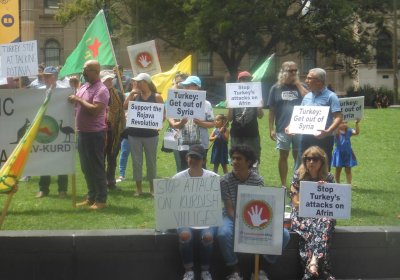Turkish forces have invaded Rojava — the Kurdish-majority multi-ethnic territory of the Autonomous Administration of North and East Syria (AA). In a telephone call to Turkey’s authoritarian President Recep Tayyip Erdogan, United States president Donald Trump gave the invasion a green light.
Syrian Democratic Forces (SDF)
In 2012, the newly formed Kurdish self-defence forces took control of the town of Kobanê from the Assad regime’s forces.
Despite all the immense challenges facing it, the revolution has survived. It has provided tremendous inspiration to people around the world. It thus has a global meaning and relevance.
July 19 marked the seventh anniversary of northern Syria’s Rojava Revolution. On that day in 2012 the nascent People’s Protection Units (YPG) took control of the Kurdish-majority city of Kobanê. The outnumbered forces of Syrian dictator Bashar al-Assad surrendered and were allowed to depart (without their weapons). Other Kurdish cities and towns in the north were soon liberated as well.
Since the liberation of the last of the ISIS-occupied territory this year, the self-administered areas of northern and eastern Syria set up by the liberation forces have enjoyed secure and stable conditions. However, they have been denied representation in the international negotiations to resolve the Syrian crisis, write Ismet Tashtan and Peter Boyle.
US president Donald Trump announced by tweet on December 19 his intention to withdraw US troops from Syria. This followed a phone call between Trump and Turkish President Recep Tayyip Erdogan, who had often stated his intention to invade north-eastern Syria.
The Assad regime and its allies have been building up their forces around the rebel-held Idlib province, in Syria’s north-west, in preparation for a major offensive. Some bombing raids have already been carried out in the south and west of the province.
When a democratic uprising broke out against the Syrian dictatorship of Bashar al-Assad in 2011, the regime responded with brutal repression. Aided by defections from the Syrian Army, this helped turn the mass protest movement into the armed conflict that wracks Syria today.
The defeat of ISIS in Syria last year raised hopes that the long-running war that has displaced more than two-thirds of the population might be coming to an end. However, the attempted Turkish invasion of the Afrin region of Rojava (Syrian Kurdistan), which began on January 20, has underlined that the war is in fact intensifying.
Afrin invasion: Turkey attacks northern Syria’s democratic revolution — with Russian and US approval
Three years after Kurdish-led forces liberated the northern Syrian city of Kobane from ISIS — after a months-long siege that captured the world’s imagination — the democratic, multi-ethnic and feminist revolution in Syria’s north is facing a new assault.
After receiving approval from Russia, the Turkish state has launched an air strike with 69 jets, bombing the Afrin centre and Cindirêsê, Reco, Shera, Shêrawa and Mabeta districts in northern Syria, ANF News reported on January 20.
Academics and international human rights activists launched a petition calling upon world powers to act against Turkish aggression against Afrin, ANF News reported.
The umbrella organisation of political and social movements in northern Syria, Movement for Democratic Society (TEV-DEM), released a statement on recent attacks and threats by the Turkish state.
Turkey has attacked the Afrin district in northern Syria, which is part of the Northern Syria Democratic Federation that is seeking to create a new revolutionary system of “democratic confederalism”.
- Previous page
- Page 2
- Next page











